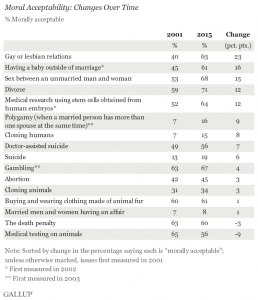Are Social Issues Hurting Republicans?
< < Go Back
Not as much as liberals hope, but the GOP does need to change its rhetoric on some issues.
This is a time when it’s necessary to read beyond the headlines. A May 10 Gallup survey shows that the share of Americans calling themselves social liberals has risen to 31% from 25% in 2009, while the share of self-described social conservatives has fallen to 31% from 42%. It is the first time social conservatives have not outnumbered social liberals since Gallup began asking the question in 1999. As recently as 2010, social conservatives led by 17 points.
All this was trumpeted as bad news for Republicans. But what’s driving this shift is largely Democrats lurching further leftward. In 2010, more Democrats described themselves as social moderates than social liberals, 41% to 37%. Today, 53% of Democrats are social liberals and 31% social moderates.
The GOP, on the other hand, has become somewhat more socially moderate. Since 2010, the share of Republicans describing themselves as social conservatives has dropped to 53% from 62%. During the same period social moderates rose to 34% from 31% and social liberals grew to 11% from 7%.
Much of this appears to be driven by rapid acceptance of same-sex marriage. In 2009, Gallup found 40% of respondents said such marriages should be valid and 57% said they should not. This year, support is at 60% and opposition at 37%. The Supreme Court may settle the issue or perhaps leave it to the states, but acceptance is now 76% among Democrats, 64% with Independents and 37% among Republicans.
The country is not more liberal on all social issues, however, most significantly on abortion. In January 2003, the 30th anniversary of Roe v. Wade, 39% of Americans told CBS News that abortion should be generally available, 38% favored it being available under stricter limits, and 22% said it should not be permitted. In March of this year, CBS found those numbers were now 38% generally available, 34% available under stricter limits and 25% not permitted.
Nor has the move on social issues been accompanied by a similar shift in economic attitudes. When Gallup first asked in 1999, 44% of Americans described their economic views as conservative and 16% as liberal. Those numbers are now 39% conservative and 19% liberal.
But under President Barack Obama, the country has become somewhat more supportive of bigger government.
What does all this mean for Republicans? Since 43% of all the votes Mitt Romney received in 2012 came from white evangelical Christians, the GOP would fracture if it abandoned its long-standing support for traditional morality. The Republican Party is the home of cultural conservatives and should remain so, not only for political reasons but also for moral ones.
Yet the GOP must find language that holds social conservatives while attracting socially moderate independents and even Democrats who think their party’s left wing is too wacky. Republicans have done that on abortion—arguing that while the Supreme Court has held that abortion must be legal, people should find common ground to make sure it’s rare.
Republicans must also treat social conservatives as engaged citizens rather than single-issue voters. This means emphasizing economic and foreign policy issues about which they are deeply concerned this cycle.
Yet the GOP can no longer take for granted the plurality of economic conservative voters. New technologies are disrupting the economy, creating anxiety among working-class Americans.
The GOP’s 2016 campaign must not be one simply of mobilization and turnout, though both are important. It must also be a campaign of persuasion that pulls in millions of Americans who have not voted Republican in recent years. This means nominating a candidate who both excites the base and appeals beyond it. That’s easy to say, harder to do.
More From Rove.com:




